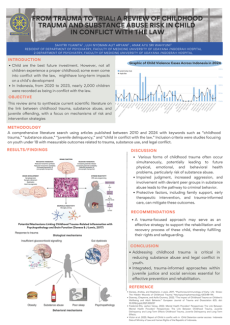From Trauma to Trial: A Review of Childhood Trauma and Substance Abuse Risk in Child in Conflict with the Law
Submitted by Savitri Yuanita
-

| Introduction. Child in conflict with the law often present with complex psychosocial backgrounds, prominently featuring histories of childhood trauma. Emerging evidence suggests a strong correlation between early traumatic experiences and subsequent substance abuse, both of which increase the likelihood of delinquent behavior. This review aims to synthesize current scientific literature on the link between childhood trauma, substance abuse, and juvenile offending, with a focus on mechanisms of risk and intervention strategies. Method. A comprehensive literature search was conducted using PubMed, PsycINFO, and Scopus. Peer-reviewed articles published between 2010 and 2024 were included using keywords such as “childhood trauma,” “substance abuse,” “juvenile delinquency,” and “child in conflict with the law.” Inclusion criteria were studies focusing on youth under 18 with measurable outcomes related to trauma, substance use, and legal conflict. Results. Findings indicate a significant association between various forms of trauma—including physical, sexual, and emotional abuse—and increased risk of early substance use. Substance abuse, in turn, mediates the pathway to criminal behavior through impaired judgment, increased aggression, and involvement with deviant peer groups. Neurobiological impacts of trauma, such as dysregulation of the stress response system, further compound these risks. Protective factors, including family support, early therapeutic intervention, and trauma-informed care, can mitigate these outcomes. Conclusion. Addressing childhood trauma is critical in reducing substance abuse and legal conflict in youth. Integrated, trauma-informed approaches within juvenile justice and social services are essential for effective prevention and rehabilitation. Keywords: Childhood trauma, substance abuse, child in conflict with the law |